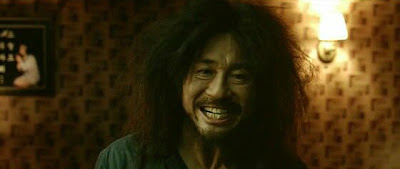Take a sneak peak into a true modern cult classic from contemporary Korean cinema at its best as Andrew Nette shares his thoughts about Oldboy (2003). Directed by Park Chan-wook, Oldboy will be at this year's KOFFIA as part of the Modern Classics section.
It’s not the first time I’ve said this in print, but South
Korea seems to be leading the pack at the moment in terms of producing top-notch crime cinema that’s
completely unafraid to mix and match different genres.
Think Kim Ji-woon’s I Saw The Devil, Lee Jeong-beom’s The Man From Nowhere
and Na Hong-jin’s The Yellow Sea.
Another example is Park Chan-wook’s 2003 movie Oldboy, playing as part of this year’s Korean Film Festival in Australia on the big screen.
Part blood soaked revenge movie, part psychological thriller, Oldboy was Park’s ninth film. Among his
earlier efforts was the excellent military thriller J.S.A: Joint Security Area in 2000 and Sympathy for Mr. Vengeance in 2002. But it was Oldboy that brought him international attention and, arguably, can
be credited as the film that first exposed Western art house audiences to South
Korean cinema.
Oldboy’s premise is
deceptively simple. A thoroughly disagreeable, but in most other respects,
average South Korean salary man gets kidnapped off the streets of Seoul and
imprisoned without explanation for 15 years. Once released he is informed by an
anonymous caller that he has five days to find out who imprisoned him
and told to review his life for clues as to who it could be.
Choi Min-sik (who starred in I Saw the Devil) plays the kidnapping victim, Oh Dae-su. We see just
enough of Oh’s day-to-day life in captivity to establish how horrific the
experience is, no more. The artificial light, the sleeping gas that seeps into
his room every time his captors need to shave or bath him, the same dumplings
slid through a slot in the cell door, day after day.
During these scenes, Oh shifts between resignation, anger
and near insanity. Every aspect of the experience is designed for maximum
disorientation. Even the TV, his one link to the outside world, becomes an
instrument of torture when it broadcasts a news report that his wife has been
murdered and Oh is the main suspect.
Oh finally hatches a plan to escape, when, just as suddenly
as he was captured he wakes up on top of an apartment block a free man. Well,
technically free at least. He’s still wanted by the police for murdering of his
wife and has been left severely deranged by his prison experience.
He wanders into a restaurant and strikes up a conversation
with a child-like waitress called Mi-do (Kang Hye-jeong). She takes
him in and helps him track down clues as to who is responsible for kidnapping
and imprisonment. Gradually, Oh comes to realise the sheer size and scale of
the scheme that has involved him.
Like nearly every South Korean crime film I’ve seen, Oldboy has lot of blood flowing from
many different parts of the body. I’ve often wondered why South Korean crime cinema
is so full of characters fighting each other with instruments such as knifes,
cleavers and hammers, when their American and European brethren just shoot each
other. Perhaps it has something to do with the South Korean Government’s stringently
enforced gun-control laws.
But while the violence in Oldboy is not for the faint hearted, it is accompanied by an
examination of much more sophisticated themes. In particular, has his enforced
captivity resulted in Oh losing his mind and becoming incapable of functioning
in normal society or has his brutalisation equipped him to better deal with the
world? And, as his anonymous tormentor taunts him over the phone at one point,
has Dae-su simply traded a small prison for a much larger one?
Park Chan-wook depicts Seoul as a hellish place. A rain-soaked neon
world of homeless people, lost youth and murderous gangsters, which lacks any
sign of cohesion or state authority.
All the actors do a good job, but without a doubt the film
belongs to Choi. His ability to switch between blood-soaked avenger and existentially
traumatised victim is amazing to watch. His reaction to the news about his true
relationship with Mi-do is particularly brilliant.
A US remake of Oldboy
is underway, directed by Spike Lee and starring Elizabeth Olsen and Josh
Brolin. While Lee is an accomplished director, I can’t see his reboot laying a
glove on the original. Park’s film is a dark and unrelenting tale without so
much as a shred of mercy in it.
Andrew Nette is a Melbourne-based writer. His first novel, Ghost Money, is released through Snubnose Press in August. His blog www.pulpcurry.com looks at crime fiction and film, with a focus on Asia and Australia.
For session times for Oldboy, visit the KOFFIA website.




No comments:
Post a Comment